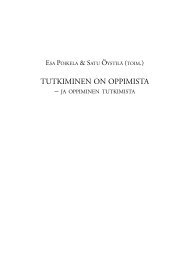Note on this edition: this is an electronic version of the 1999 book ...
Note on this edition: this is an electronic version of the 1999 book ...
Note on this edition: this is an electronic version of the 1999 book ...
You also want an ePaper? Increase the reach of your titles
YUMPU automatically turns print PDFs into web optimized ePapers that Google loves.
The Dem<strong>on</strong>ic in <strong>the</strong> Self 77ing into <strong>the</strong> air, d<strong>an</strong>cing. H<strong>is</strong> very gestures express ench<strong>an</strong>tment. Just as<strong>the</strong> <strong>an</strong>imals now talk, <strong>an</strong>d <strong>the</strong> earth yields milk <strong>an</strong>d h<strong>on</strong>ey, supernaturalsounds em<strong>an</strong>ate from him, too: he feels himself a god, he himself nowwalks about ench<strong>an</strong>ted, in ecstasy, like <strong>the</strong> gods he saw walking in h<strong>is</strong>dreams. He <strong>is</strong> no l<strong>on</strong>ger <strong>an</strong> art<strong>is</strong>t, he has become a work <strong>of</strong> art […]. 102The inversi<strong>on</strong> <strong>of</strong> <strong>the</strong> traditi<strong>on</strong>al dual<strong>is</strong>m between <strong>the</strong> subject <strong>an</strong>d objectsignals also o<strong>the</strong>r tr<strong>an</strong>sgressive features, that Nietzsche <strong>is</strong> able to perceive intragedy <strong>an</strong>d <strong>the</strong> daim<strong>on</strong>ic. He pays special attenti<strong>on</strong> to <strong>the</strong> c<strong>on</strong>necti<strong>on</strong> <strong>of</strong>tragedy to <strong>the</strong> satyric, <strong>an</strong>d claims that “<strong>the</strong> satyr, <strong>the</strong> fictitious natural being,bears <strong>the</strong> same relati<strong>on</strong> to <strong>the</strong> m<strong>an</strong> <strong>of</strong> culture that Di<strong>on</strong>ysi<strong>an</strong> music bears tocivilizati<strong>on</strong>.” 103 Nietzsche’s aes<strong>the</strong>tic interest was directed towards <strong>the</strong> tensi<strong>on</strong>between harm<strong>on</strong>y <strong>an</strong>d d<strong>is</strong>s<strong>on</strong><strong>an</strong>ce, <strong>the</strong> Apoll<strong>on</strong>i<strong>an</strong> <strong>an</strong>d <strong>the</strong> Di<strong>on</strong>ysi<strong>an</strong>,but he emphas<strong>is</strong>es <strong>the</strong> signific<strong>an</strong>ce <strong>of</strong> <strong>the</strong> d<strong>is</strong>cord<strong>an</strong>t, <strong>of</strong>ten ignored by classicalscholars. The principal target <strong>of</strong> Nietzsche’s attack was not <strong>the</strong> harm<strong>on</strong>iousApoll<strong>on</strong>i<strong>an</strong>, but what he called <strong>the</strong> “dem<strong>on</strong> <strong>of</strong> Socrates” – <strong>the</strong> intellectual<strong>an</strong>imosity towards <strong>the</strong> mythical “truths.” The first versi<strong>on</strong> <strong>of</strong> <strong>the</strong> studywas titled “Socrates <strong>an</strong>d Instinct” 104 (in 1870), <strong>an</strong>d Nietzsche wrote thattragedy was destroyed by <strong>the</strong> c<strong>on</strong>flict between <strong>the</strong> Di<strong>on</strong>ysi<strong>an</strong> spirit <strong>an</strong>d <strong>the</strong>Socratic versi<strong>on</strong> <strong>of</strong> rati<strong>on</strong>ality.Di<strong>on</strong>ysus had already been scared from <strong>the</strong> tragic stage, by a dem<strong>on</strong>icpower speaking through Euripides. Even Euripides was, in a sense, <strong>on</strong>ly amask: <strong>the</strong> deity that spoke through him was nei<strong>the</strong>r Di<strong>on</strong>ysus nor Apollo,but <strong>an</strong> altoge<strong>the</strong>r newborn dem<strong>on</strong> [Däm<strong>on</strong>], called Socrates. 105Nietzsche’s <strong>the</strong>ory <strong>is</strong> nowhere presented clearly <strong>an</strong>d unambiguously,but he actually opposed <strong>the</strong> figure <strong>of</strong> Socrates <strong>on</strong> <strong>the</strong> grounds <strong>of</strong> a daim<strong>on</strong>icview <strong>of</strong> selfhood. As Plato writes in <strong>the</strong> Apology, Socrates was notorious forquesti<strong>on</strong>ing <strong>the</strong> w<strong>is</strong>dom <strong>of</strong> h<strong>is</strong> c<strong>on</strong>temporaries; when he examined <strong>the</strong> poets,for example, he c<strong>on</strong>cluded that “it was not w<strong>is</strong>dom that enabled <strong>the</strong>m towrite <strong>the</strong>ir poetry, but a kind <strong>of</strong> instinct or inspirati<strong>on</strong>, such as you find inseers <strong>an</strong>d prophets who deliver all <strong>the</strong>ir sublime messages without knowingin <strong>the</strong> least what <strong>the</strong>y me<strong>an</strong>.” 106 Socrates also spoke about h<strong>is</strong> daim<strong>on</strong>i<strong>on</strong>, <strong>the</strong>inner voice which <strong>on</strong>ly d<strong>is</strong>suaded <strong>an</strong>d warned him from making m<strong>is</strong>takes;Nietzsche’s alternative figure to <strong>th<strong>is</strong></strong> “perfect n<strong>on</strong>-mystic” was <strong>the</strong> satyr, <strong>an</strong>ddaim<strong>on</strong>ic selfhood. “The satyr, as <strong>the</strong> Di<strong>on</strong>ysiac chor<strong>is</strong>t, dwells in a realitys<strong>an</strong>cti<strong>on</strong>ed by myth <strong>an</strong>d ritual,” Nietzsche writes. 107 Satyrs are creatures <strong>of</strong>myths, <strong>an</strong>d, according to Nietzsche, myth <strong>is</strong> necessary for our ex<strong>is</strong>tence:“The images <strong>of</strong> <strong>the</strong> myth have to be <strong>the</strong> unnoticed omnipresent dem<strong>on</strong>icguardi<strong>an</strong>s, under whose care <strong>the</strong> young soul grows to maturity <strong>an</strong>d whose102Ibid., 37 [§ I].103 Ibid., 59 [§ VII].104 Silk - Stern 1981, 43.105Nietzsche 1872/1967, 82 [§ XII].106 Plato 1954/1969, 51 [21b-22e].107Nietzsche 1872/1990, 50 [§ VII]. Here in Golffing’s tr<strong>an</strong>slati<strong>on</strong>.














